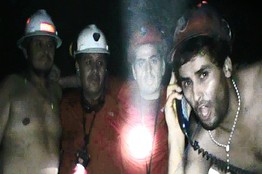moreluck
golden ticket member
Capitalism Saved the Miners
Columnist Daniel Henninger

It needs to be said. The rescue of the Chilean miners is a smashing victory for free-market capitalism.
Amid the boundless human joy of the miners' liberation, it may seem churlish to make such a claim. It is churlish. These are churlish times, and the stakes are high.
In the United States, with 9.6% unemployment, a notably angry electorate will go to the polls shortly and dump one political party in favor of the other, on which no love is lost. The president of the U.S. is campaigning across the country making this statement at nearly every stop:
"The basic idea is that if we put our blind faith in the market and we let corporations do whatever they want and we leave everybody else to fend for themselves, then America somehow automatically is going to grow and prosper."
Uh, yeah. That's a caricature of the basic idea, but basically that's right. Ask the miners.
If those miners had been trapped a half-mile down like this 25 years ago anywhere on earth, they would be dead. What happened over the past 25 years that meant the difference between life and death for those men?
Short answer: the Center Rock drill bit.
This is the miracle bit that drilled down to the trapped miners. Center Rock Inc. is a private company in Berlin, Pa. It has 74 employees. The drill's rig came from Schramm Inc. in West Chester, Pa. Seeing the disaster, Center Rock's president, Brandon Fisher, called the Chileans to offer his drill. Chile accepted. The miners are alive.
Longer answer: The Center Rock drill, heretofore not featured on websites like Engadget or Gizmodo, is in fact a piece of tough technology developed by a small company in it for the money, for profit. That's why they innovated down-the-hole hammer drilling. If they make money, they can do more innovation.
This profit = innovation dynamic was everywhere at that Chilean mine. The high-strength cable winding around the big wheel atop that simple rig is from Germany. Japan supplied the super-flexible, fiber-optic communications cable that linked the miners to the world above.
A remarkable Sept. 30 story about all this by the Journal's Matt Moffett was a compendium of astonishing things that showed up in the Atacama Desert from the distant corners of capitalism.
Samsung of South Korea supplied a cellphone that has its own projector. Jeffrey Gabbay, the founder of Cupron Inc. in Richmond, Va., supplied socks made with copper fiber that consumed foot bacteria, and minimized odor and infection.
Chile's health minister, Jaime Manalich, said, "I never realized that kind of thing actually existed."
The profit = innovation dynamic was everywhere at the mine rescue site.
That's right. In an open economy, you will never know what is out there on the leading developmental edge of this or that industry. But the reality behind the miracles is the same: Someone innovates something useful, makes money from it, and re-innovates, or someone else trumps their innovation. Most of the time, no one notices. All it does is create jobs, wealth and well-being. But without this system running in the background, without the year-over-year progress embedded in these capitalist innovations, those trapped miners would be dead.
Some will recoil at these triumphalist claims for free-market capitalism. Why make them now?
Here's why. When a catastrophe like this occurs—others that come to mind are the BP well blowout, Hurricane Katrina, various disasters in China—a government has all its chips pushed to the center of the table. Chile succeeds (it rebuilt after the February earthquake with phenomenal speed). China flounders. Two American administrations left the public agog as they stumbled through the mess.

Associated Press High-tech kept Chilean miners in touch with the surface.

Still, what the political class understands is that all such disasters wash away eventually, and that life in a developed nation reverts to a tolerable norm. If the Obama administration refuses to complete free-trade agreements with Colombia, South Korea and Panama, no big deal. It's only politics.
But that's not true. Getting a nation's economics right is more important than at any time since the end of World War II. Chile, Colombia, Peru and Brazil are pulling away from the rest of their hapless South American neighbors. China, India and others are simply copying or buying the West's accomplishments.
The U.S. has a government led by a mindset obsessed with 250K-a-year "millionaires" and given to mocking "our blind faith in the market." In a fast-moving world filled with nations intent on catching up with or passing us, this policy path is a waste of time.
The miners' rescue is a thrilling moment for Chile, an imprimatur on its rising status. But I'm thinking of that 74-person outfit in Berlin, Pa., whose high-tech drill bit opened the earth to free them. You know there are tens of thousands of stories like this in the U.S., as big as Google and small as Center Rock. I'm glad one of them helped save the Chileans. What's needed now is a new American economic model that lets our innovators rescue the rest of us.
Columnist Daniel Henninger

It needs to be said. The rescue of the Chilean miners is a smashing victory for free-market capitalism.
Amid the boundless human joy of the miners' liberation, it may seem churlish to make such a claim. It is churlish. These are churlish times, and the stakes are high.
In the United States, with 9.6% unemployment, a notably angry electorate will go to the polls shortly and dump one political party in favor of the other, on which no love is lost. The president of the U.S. is campaigning across the country making this statement at nearly every stop:
"The basic idea is that if we put our blind faith in the market and we let corporations do whatever they want and we leave everybody else to fend for themselves, then America somehow automatically is going to grow and prosper."
Uh, yeah. That's a caricature of the basic idea, but basically that's right. Ask the miners.
If those miners had been trapped a half-mile down like this 25 years ago anywhere on earth, they would be dead. What happened over the past 25 years that meant the difference between life and death for those men?
Short answer: the Center Rock drill bit.
This is the miracle bit that drilled down to the trapped miners. Center Rock Inc. is a private company in Berlin, Pa. It has 74 employees. The drill's rig came from Schramm Inc. in West Chester, Pa. Seeing the disaster, Center Rock's president, Brandon Fisher, called the Chileans to offer his drill. Chile accepted. The miners are alive.
Longer answer: The Center Rock drill, heretofore not featured on websites like Engadget or Gizmodo, is in fact a piece of tough technology developed by a small company in it for the money, for profit. That's why they innovated down-the-hole hammer drilling. If they make money, they can do more innovation.
This profit = innovation dynamic was everywhere at that Chilean mine. The high-strength cable winding around the big wheel atop that simple rig is from Germany. Japan supplied the super-flexible, fiber-optic communications cable that linked the miners to the world above.
A remarkable Sept. 30 story about all this by the Journal's Matt Moffett was a compendium of astonishing things that showed up in the Atacama Desert from the distant corners of capitalism.
Samsung of South Korea supplied a cellphone that has its own projector. Jeffrey Gabbay, the founder of Cupron Inc. in Richmond, Va., supplied socks made with copper fiber that consumed foot bacteria, and minimized odor and infection.
Chile's health minister, Jaime Manalich, said, "I never realized that kind of thing actually existed."
The profit = innovation dynamic was everywhere at the mine rescue site.
That's right. In an open economy, you will never know what is out there on the leading developmental edge of this or that industry. But the reality behind the miracles is the same: Someone innovates something useful, makes money from it, and re-innovates, or someone else trumps their innovation. Most of the time, no one notices. All it does is create jobs, wealth and well-being. But without this system running in the background, without the year-over-year progress embedded in these capitalist innovations, those trapped miners would be dead.
Some will recoil at these triumphalist claims for free-market capitalism. Why make them now?
Here's why. When a catastrophe like this occurs—others that come to mind are the BP well blowout, Hurricane Katrina, various disasters in China—a government has all its chips pushed to the center of the table. Chile succeeds (it rebuilt after the February earthquake with phenomenal speed). China flounders. Two American administrations left the public agog as they stumbled through the mess.

Associated Press High-tech kept Chilean miners in touch with the surface.

Still, what the political class understands is that all such disasters wash away eventually, and that life in a developed nation reverts to a tolerable norm. If the Obama administration refuses to complete free-trade agreements with Colombia, South Korea and Panama, no big deal. It's only politics.
But that's not true. Getting a nation's economics right is more important than at any time since the end of World War II. Chile, Colombia, Peru and Brazil are pulling away from the rest of their hapless South American neighbors. China, India and others are simply copying or buying the West's accomplishments.
The U.S. has a government led by a mindset obsessed with 250K-a-year "millionaires" and given to mocking "our blind faith in the market." In a fast-moving world filled with nations intent on catching up with or passing us, this policy path is a waste of time.
The miners' rescue is a thrilling moment for Chile, an imprimatur on its rising status. But I'm thinking of that 74-person outfit in Berlin, Pa., whose high-tech drill bit opened the earth to free them. You know there are tens of thousands of stories like this in the U.S., as big as Google and small as Center Rock. I'm glad one of them helped save the Chileans. What's needed now is a new American economic model that lets our innovators rescue the rest of us.
